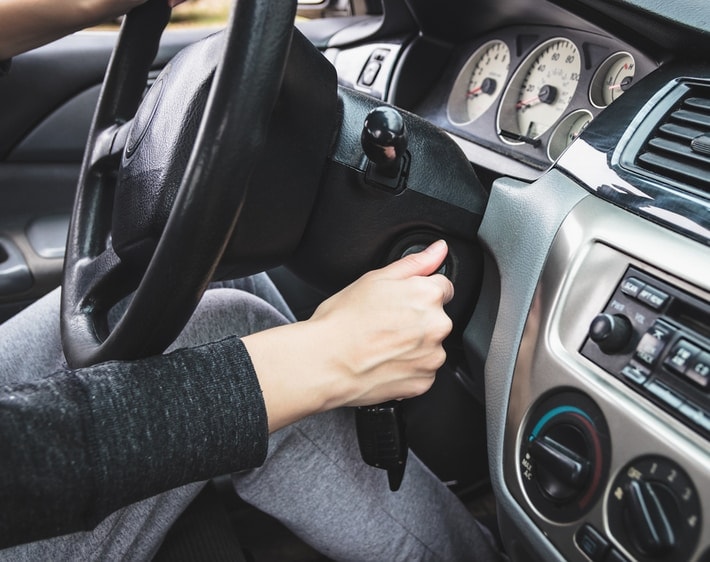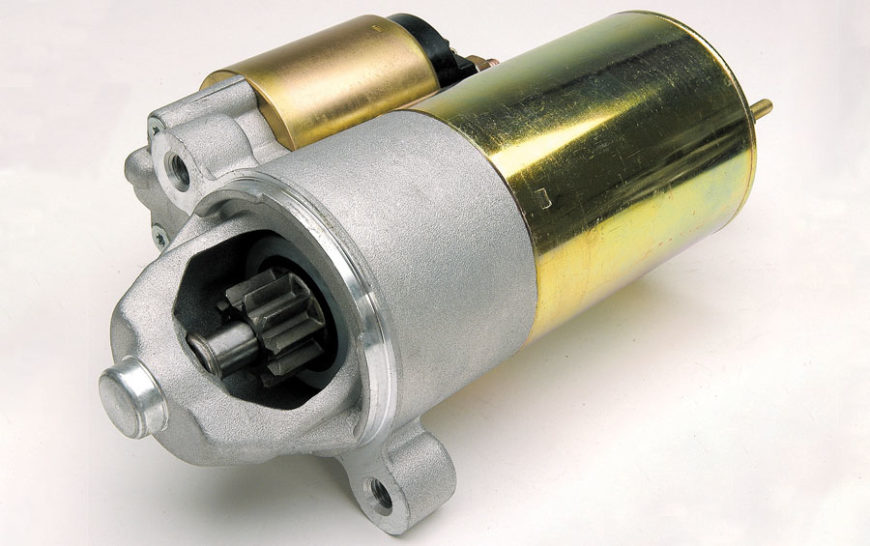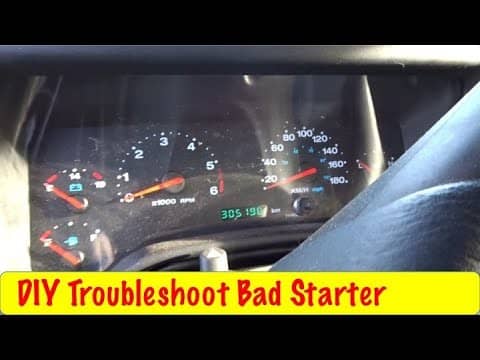You can tell your starter is going bad if your engine cranks slowly or makes grinding noises. Additionally, a clicking sound or a burning smell may also indicate starter issues.
If you experience any of these symptoms, it’s important to have your vehicle evaluated by a professional mechanic. Ignoring these signs can lead to further damage to your engine or electrical system. Taking prompt action can save you from costly repairs down the road and ensure the safety and reliability of your vehicle.
Regular maintenance and awareness of potential issues are key to keeping your car in good working condition and avoiding unexpected breakdowns.

Credit: www.firestonecompleteautocare.com
Signs Of A Failing Starter
Recognizing signs of a failing starter is crucial. If your engine struggles to start or makes grinding noises, your starter might be going bad. Don’t ignore these symptoms to avoid being stranded.
Engine Cranks Slowly
One of the key signs that your starter may be going bad is if your engine cranks slowly when you turn the key. When you attempt to start your vehicle, you may notice that the engine takes longer than usual to turn over. This sluggish cranking can be an indication that the starter motor isn’t functioning properly and is struggling to engage with the engine to initiate the combustion process. Slow cranking could be due to a weak or dying battery, but if you’ve ruled that out, it’s likely a sign of a failing starter.
Clicking Noise When Key Is Turned
Another telltale sign that your starter could be going bad is if you hear a clicking noise when you turn the key in the ignition. This distinct clicking sound is often caused by a malfunctioning starter solenoid. The solenoid is responsible for transmitting the electrical current from the battery to the starter motor, allowing it to engage with the engine. When the solenoid fails, it may click repeatedly instead of engaging the starter motor, preventing the engine from starting. If you hear this clicking noise without the engine turning over, it’s time to have your starter inspected and potentially replaced.

Credit: www.autozone.com
Common Symptoms Of A Bad Starter
A failing starter motor can lead to frustrating and inconvenient issues with your vehicle’s starting system. Identifying the common symptoms of a bad starter can help you address the problem as soon as possible, preventing any further damage to your vehicle.
Intermittent Starting Problems
One of the most prevalent signs of a bad starter is when you experience intermittent starting problems. Your vehicle may fail to start every time you turn the key, or it may start only occasionally. It can be a result of a worn-out solenoid or internal electrical connections.
Smoke Coming From The Starter
Another indication of a faulty starter is smoke coming from the unit. If you notice smoke or a burning odor when trying to start your vehicle, it could be a clear sign that the starter motor is overheating due to mechanical or electrical issues.
Diagnosing Starter Issues
If your car is experiencing difficulties starting, it may be due to a faulty starter. Diagnosing starter issues is crucial for ensuring your vehicle’s reliability and safety. By understanding the common symptoms and performing simple tests, you can identify a failing starter before it leaves you stranded.
Checking Battery Connections
Loose or corroded battery connections can impede the flow of current to the starter motor, leading to starting issues. To diagnose this, visually inspect the battery terminals for any signs of corrosion or looseness. Ensure that the connections are tight and free of any visible corrosion. Using a wire brush, clean the terminals and connectors to remove any corrosion buildup that may be affecting the flow of electricity.
Testing Voltage At The Starter Solenoid
To determine if the starter is receiving the necessary voltage, perform a voltage test at the starter solenoid. Use a multimeter to measure the voltage between the positive terminal of the battery and the S terminal of the starter solenoid. Ideally, the voltage should be close to the battery voltage. A significantly lower reading could indicate wiring or connection issues between the battery and the starter solenoid.
Possible Reasons For Starter Failure
Possible reasons for starter failure include a clicking sound when turning the key, difficulty starting the engine, or complete failure to start. These signs indicate that your starter may be going bad and require replacement.
Possible Reasons for Starter Failure Age and Wear: The age and wear of a starter can be a major factor in its failure. Over time, the internal components of the starter can wear down, leading to decreased performance and eventually complete failure. The starter motor, solenoid, and other parts may become worn out, causing the starter to struggle or not engage at all. Electrical Issues: Electrical issues can also be a culprit for starter failure. Problems with the starter’s electrical connections, such as loose or corroded wires, can prevent the starter from receiving the necessary power to function properly. Additionally, issues with the battery or alternator can hinder the starter’s performance and potentially cause it to fail. Mechanical Problems: Mechanical problems can also contribute to starter failure. If the starter motor becomes jammed or seized, it may not be able to turn the engine over. This can be caused by factors such as a faulty flywheel, a damaged starter drive gear, or a problem with the engine itself. In these cases, the starter may need to be replaced or repaired. Insufficient Maintenance: Lack of proper maintenance can lead to starter failure as well. Neglecting routine inspections and services can allow issues to go unnoticed and worsen over time. Regularly checking and cleaning the starter’s electrical connections, as well as ensuring the battery is in good condition, can help prevent starter failure. Improper Installation: Lastly, improper installation can also be a reason for starter failure. If the starter is not installed correctly or if incompatible parts are used, it can put unnecessary strain on the starter and cause it to fail prematurely. It is important to follow the manufacturer’s instructions and use the correct components when installing a new starter. Understanding the possible reasons for starter failure can help you diagnose and address issues promptly. By keeping an eye out for signs such as slow cranking or clicking sounds, you can take necessary measures to prevent further damage and ensure your vehicle’s starter operates smoothly. As with any mechanical component, proper maintenance and care can go a long way in extending the lifespan of your starter.Preventive Measures For Starter Problems
Spotting signs of a failing starter can save you from unexpected breakdowns. Look for slow cranking and clicking noises when starting the engine. Keep an eye on warning lights and have a professional check the electrical system regularly to prevent starter problems and maintain a smooth driving experience.
Regular Maintenance
Regular maintenance can help prevent starter issues before they arise.
Using Quality Parts
Using high-quality parts ensures longevity and reliability of your starter.
Inspect the starter for any signs of wear and tear regularly.
Keep the starter area clean and free from debris.
Ensure proper electrical connections to the starter.
Choose a reputable mechanic for starter maintenance and repairs.
Credit: repairpal.com
Frequently Asked Questions Of How Do You Know If Your Starter Is Going Bad
What Are The Symptoms Of A Bad Starter?
Common symptoms of a bad starter include slow or no engine cranking, clicking sound, and dashboard lights dimming. If you experience these, it’s likely your starter needs attention.
What Happens Before Your Starter Goes Out?
The starter goes out because of wear and tear, electrical issues, or a faulty solenoid.
How Do You Tell If It’s A Starter Or Alternator?
To determine if it’s a starter or alternator, listen for clicking sounds (starter) or growling noises (alternator) when starting the car. Check battery health for alternator, while starter issues affect starting ability. Professional diagnosis is recommended for accurate identification.
How Can You Test If A Starter Is Bad?
To test if a starter is bad, listen for a clicking noise when turning the key. Check battery connections for corrosion and ensure there is power going to the starter. If the starter doesn’t engage or turns slowly, it may be faulty and needs replacing.
Conclusion
To sum it up, detecting a failing starter is important to avoid being stranded on the road. By paying attention to the warning signs such as slow cranking, clicking noises, and engine failure to start, you can take prompt action and prevent further damage to your vehicle.
Regular maintenance and understanding the symptoms will help you stay proactive and ensure a smooth driving experience. So, keep an eye out for these signs and address them promptly to avoid any inconvenience in the future.
